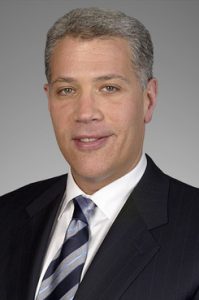New Akin Gump Program Lets Lawyers 'Jump' to Other Offices
Associates proposed Akin JUMP! as part of a hackathon earlier this year.
December 27, 2018 at 04:36 PM
4 minute read

With its newest talent development program, Akin Gump Strauss Hauer & Feld is aiming to get young lawyers better connected with their colleagues across the globe.
The firm has launched a short-term travel program that allows associates and counsel at the third-year level and above to spend time in other offices. The “Akin JUMP!” initiative came straight from the firm's young lawyers—it was developed by midlevel associates at a hackathon earlier this year.
Each participant will be allowed to “jump” from their main office to another Akin Gump location, where they will have a sponsor in the office, and the firm will cover their travel expenses. They will all be required to submit proposals spelling out the business case for their visits, most of which will last one to two weeks, the firm said.
The program was announced Dec. 19, and associates and counsel will be able to submit their jump proposals beginning Jan. 2. According to hiring partner David Botter, the firm will limit the program to 25 jumps per year so there aren't too many lawyers traveling outside their main offices at any given time.
 David H. Botter, partner with Akin Gump Strauss Hauer & Feld.
David H. Botter, partner with Akin Gump Strauss Hauer & Feld.Botter said the program will be especially useful for lawyers who work in practices spread across multiple offices, as well as for those who work with clients in other cities.
“People have done this somewhat on an ad hoc basis and have found it to be very useful, getting to spend time with people they're working with across a computer or a phone constantly,” Botter said. “For the midlevel associate who is looking to take their career to the next level, it's a great opportunity.”
He said the program is limited to third-years and above because it seemed unlikely to be as effective for newer associates. But the intent is for the program to be useful to as many lawyers as possible, he said.
The proposals that led to Akin JUMP! were derived from two of the three winning ideas from the firm's most recent hackathon, which was part of its annual training and development program for fourth-year associates. The third winning proposal—10 weeks of paid parental leave for all parents—was also implemented this year, Botter said.
Hackathons have become an increasingly popular tool in the legal industry for seeking broad-based input for law firm innovation. In February of this year, numerous legal industry players including law firms hosted such events in 40 cities across the globe, as part of the Global Legal Hackathon.
Diversity Lab has also begun hosting its own hackathons to tackle diversity and inclusion issues in the legal industry, the first of which led to the development of the Mansfield Rule, which has now been adopted by a number of firms.
And individual firms have held their own hackathon events. Bryan Cave held a software development hackathon as part of its Bryan Cave Business Academy several years ago. Midwestern midsize firm Sandberg Phoenix & von Gontard held an “Idea-a-Thon” last year that led to changes in the firm's associate compensation program, including a vacation credit for billable hours and other new benefits that young lawyers proposed.
Cleary Gottlieb Steen & Hamilton recently launched an app that allows associates to request an informal feedback session with senior lawyers. The app, called ClearyLoop, was developed by associates at a hackathon earlier this year.
READ MORE:
Cleary Launches New Feedback App for Associates
Akin Gump Lobbyists to Open Capitol Hill Space Ahead of DC Office Move
Akin Gump Lands Trans-Atlantic Restructuring and Debt Finance Group From Morgan Lewis
Lawyers, Developers Team Up in Hackathon to Revamp Legal Industry
This content has been archived. It is available through our partners, LexisNexis® and Bloomberg Law.
To view this content, please continue to their sites.
Not a Lexis Subscriber?
Subscribe Now
Not a Bloomberg Law Subscriber?
Subscribe Now
NOT FOR REPRINT
© 2025 ALM Global, LLC, All Rights Reserved. Request academic re-use from www.copyright.com. All other uses, submit a request to [email protected]. For more information visit Asset & Logo Licensing.
You Might Like
View All
Sunbelt Law Firms Experienced More Moderate Growth Last Year, Alongside Some Job Cuts and Less Merger Interest
4 minute read
Once the LA Fires Are Extinguished, Expect the Litigation to Unfold for Years
5 minute read

Trending Stories
- 1Avantia Publicly Announces Agentic AI Platform Ava
- 2Shifting Sands: May a Court Properly Order the Sale of the Marital Residence During a Divorce’s Pendency?
- 3Joint Custody Awards in New York – The Current Rule
- 4Paul Hastings, Recruiting From Davis Polk, Adds Capital Markets Attorney
- 5Chancery: Common Stock Worthless in 'Jacobson v. Akademos' and Transaction Was Entirely Fair
Who Got The Work
J. Brugh Lower of Gibbons has entered an appearance for industrial equipment supplier Devco Corporation in a pending trademark infringement lawsuit. The suit, accusing the defendant of selling knock-off Graco products, was filed Dec. 18 in New Jersey District Court by Rivkin Radler on behalf of Graco Inc. and Graco Minnesota. The case, assigned to U.S. District Judge Zahid N. Quraishi, is 3:24-cv-11294, Graco Inc. et al v. Devco Corporation.
Who Got The Work
Rebecca Maller-Stein and Kent A. Yalowitz of Arnold & Porter Kaye Scholer have entered their appearances for Hanaco Venture Capital and its executives, Lior Prosor and David Frankel, in a pending securities lawsuit. The action, filed on Dec. 24 in New York Southern District Court by Zell, Aron & Co. on behalf of Goldeneye Advisors, accuses the defendants of negligently and fraudulently managing the plaintiff's $1 million investment. The case, assigned to U.S. District Judge Vernon S. Broderick, is 1:24-cv-09918, Goldeneye Advisors, LLC v. Hanaco Venture Capital, Ltd. et al.
Who Got The Work
Attorneys from A&O Shearman has stepped in as defense counsel for Toronto-Dominion Bank and other defendants in a pending securities class action. The suit, filed Dec. 11 in New York Southern District Court by Bleichmar Fonti & Auld, accuses the defendants of concealing the bank's 'pervasive' deficiencies in regards to its compliance with the Bank Secrecy Act and the quality of its anti-money laundering controls. The case, assigned to U.S. District Judge Arun Subramanian, is 1:24-cv-09445, Gonzalez v. The Toronto-Dominion Bank et al.
Who Got The Work
Crown Castle International, a Pennsylvania company providing shared communications infrastructure, has turned to Luke D. Wolf of Gordon Rees Scully Mansukhani to fend off a pending breach-of-contract lawsuit. The court action, filed Nov. 25 in Michigan Eastern District Court by Hooper Hathaway PC on behalf of The Town Residences LLC, accuses Crown Castle of failing to transfer approximately $30,000 in utility payments from T-Mobile in breach of a roof-top lease and assignment agreement. The case, assigned to U.S. District Judge Susan K. Declercq, is 2:24-cv-13131, The Town Residences LLC v. T-Mobile US, Inc. et al.
Who Got The Work
Wilfred P. Coronato and Daniel M. Schwartz of McCarter & English have stepped in as defense counsel to Electrolux Home Products Inc. in a pending product liability lawsuit. The court action, filed Nov. 26 in New York Eastern District Court by Poulos Lopiccolo PC and Nagel Rice LLP on behalf of David Stern, alleges that the defendant's refrigerators’ drawers and shelving repeatedly break and fall apart within months after purchase. The case, assigned to U.S. District Judge Joan M. Azrack, is 2:24-cv-08204, Stern v. Electrolux Home Products, Inc.
Featured Firms
Law Offices of Gary Martin Hays & Associates, P.C.
(470) 294-1674
Law Offices of Mark E. Salomone
(857) 444-6468
Smith & Hassler
(713) 739-1250






